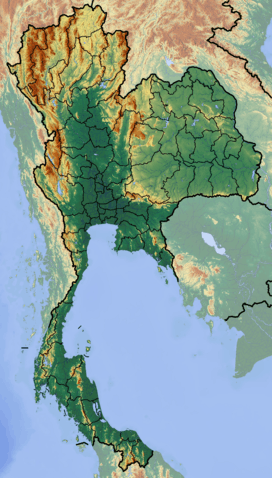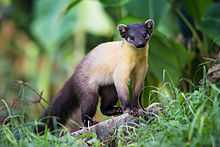Kaeng Krachan National Park
| Kaeng Krachan National Park | |
|---|---|
|
IUCN category II (national park) | |
 | |
 Map of Thailand | |
| Location | Phetchaburi and Prachuap Khiri Khan Provinces, Thailand |
| Nearest city | Phetchaburi |
| Coordinates | 12°45′0″N 99°36′0″E / 12.75000°N 99.60000°ECoordinates: 12°45′0″N 99°36′0″E / 12.75000°N 99.60000°E |
| Area | 2,914.70 km² |
| Established | 12 Jun 1981 |
Kaeng Krachan (Thai: แก่งกระจาน) is the largest national park of Thailand. It is on the border with Burma, contiguous with the Tanintharyi Nature Reserve. It is a popular park owing to its location near the tourist town of Hua Hin.
Geography
The park covers parts of the districts Nong Ya Plong, Kaeng Krachan, and Tha Yang of Phetchaburi Province, and of Hua Hin of Prachuap Khiri Khan Province. It consists mainly of rain forest on the eastern slope of the Tenasserim Mountain Range. The highest elevation is 1,200 m. Two main rivers originate within the park area, the Pranburi River and the Phetchaburi River. The Phetchaburi is blocked by the Kaeng Krachan Dam at the eastern border of the park. The dam creates a lake covering an area of 46.5 km². The dam was built in 1966.
History
The park was created on 12 June 1981 as the 28th national park of Thailand. Originally covering an area of 2,478 km², it was enlarged in December 1984 to include the boundary area between Phetchaburi and Prachuap Khiri Khan Provinces.
The park has been included in the list of ASEAN Heritage Parks. In 2005 it was also submitted to UNESCO for consideration as a future world heritage site.
The killing of wild elephants is a big problem at the park,[1] with authorities unable to control poachers.[2] Some park officials are allegedly involved in the trade of elephant parts.[3]
Despite national park status, there are private plantations within the confines of Kaeng Krachan National Park. Some of these are surrounded by electric fences which, in June 2013, fatally electrocuted an elephant calf.[4]
Flora and fauna
The forests contain a great biodiversity of tropical vegetation, including tropical and subtropical broad leaf tree species and palms. Fifty-seven species of mammals and more than 400 bird species have been counted in the park.
-

Martes flavigula, Yellow-throated marten
-

Trachypithecus obscurus, Dusky leaf monkey
-

Arachnothera magna, Streaked Spiderhunter
-

Pycnonotus flavescens, Flavescent Bulbul
-

Halcyon coromanda, Ruddy kingfisher
References
External links
- National Park, Wildlife and Plant Conservation Department
- Wildlife, attractions and maps of Kaeng Krachan National Park
- thaibirding.com on Kaeng Krachan National Park
- Visit the Kaeng Krachan National Park